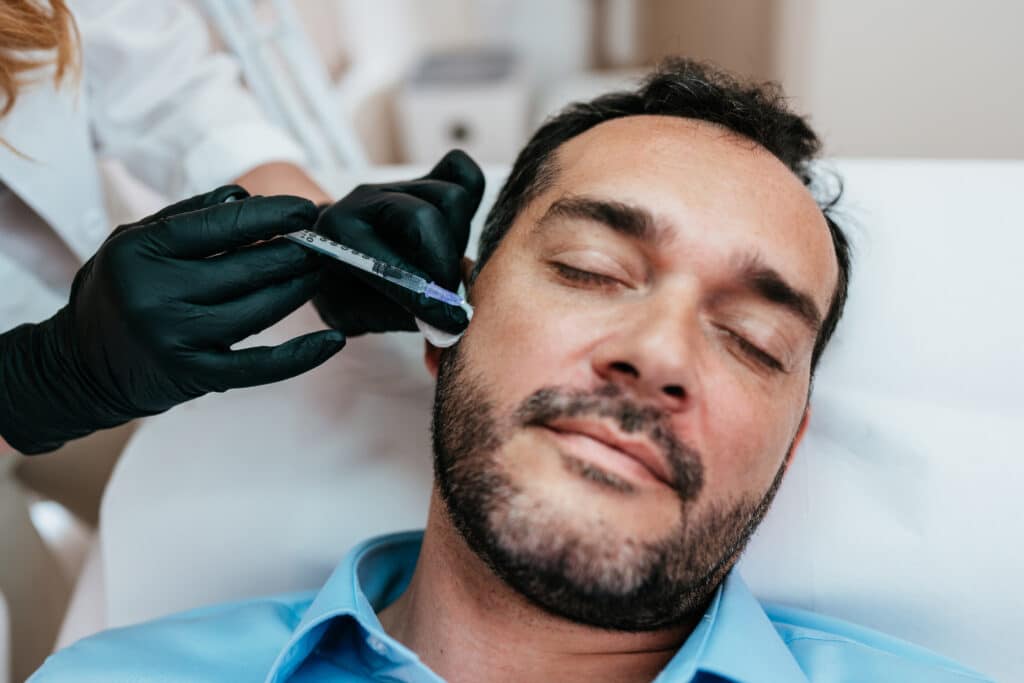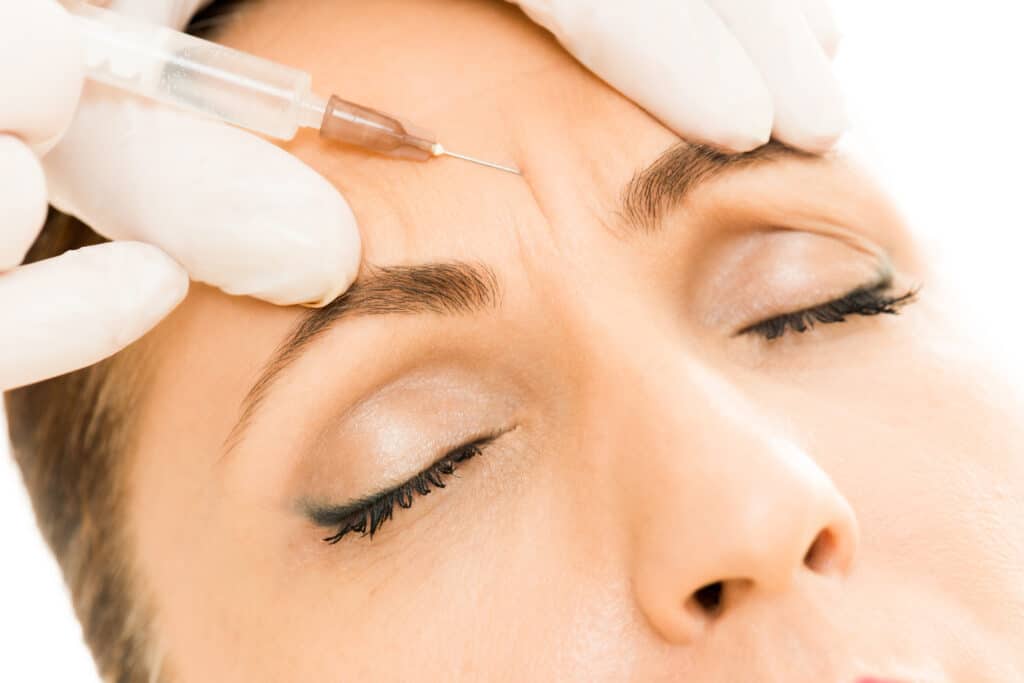Botox for Depression
Botox for Depression
COMING SOON – JUNE 2024
Exploring Expressive Benefits
Botox is a toxin approved by the FDA that is injected into the muscle with a fine needle. It works beneath the surface of the skin and temporarily reduces the underlying muscle activity to effectively softens severe frown lines, crow’s feet, and forehead lines in adults. Since its debut two decades ago, Botox has become the leading cosmetic injectable for combating the visible signs of aging.
We’ll focus specifically on its impact on frown lines, the vertical wrinkles between the eyebrows. Also known as glabellar lines, these often manifest to express negative emotions like anger, frustration, or concern—far from a relaxed expression.
Botox works by minimizing your ability to form these lines, promoting a more relaxed facial state and reducing the negative feedback sent to your brain when you frown.
The concept that our facial expressions can influence our mental and emotional well-being is not new. Practices such as yoga and meditation often encourage relaxing the forehead to alleviate stress.
PRECAUTIONS
You would not be considered a candidate for Botox® if you have any of the following:
- Myasthenia Gravis
- Allergy to Botulinum Toxin
- Neuromuscular disorder
- Pregnant or breastfeeding
- Allergy to human albumin

Botox and Its Impact on Depression
Numerous studies since the mid-2000s have investigated whether Botox can alleviate depression symptoms, with compelling results.
For instance, a study involving 28 patients with major depressive disorder found that, after six weeks, those treated with Botox showed a significantly greater improvement in depressive symptoms compared to those given a placebo.
Furthermore, a meta-analysis of clinical studies has identified Botox as an effective treatment for depression, particularly in patients unresponsive to traditional antidepressants. Researchers believe Botox may counteract depression by altering facial feedback, which can perpetuate and intensify a depressed mood.
Frequently Asked Questions
Botox is a neuromodulator (form of botulinum toxin type A) that is injected into targeted treatment areas using an ultra-fine needle. It works by blocking the nerve signals needed for facial muscles to contract. It’s the repetitious contraction of facial muscles that causes expression lines and wrinkles. Once injected, the neuromodulator relaxes the muscles and decreases their movement to reduce the appearance of lines or wrinkles in the area. You will see your results gradually over 3-7 days following injection.
Botox can be used to address lines and wrinkles on a number of different facial areas, including the forehead, eye area (crow’s feet), and lip lines. It may be injected to soften dimpling of the chin. Botox can also be injected into the muscles of the jaw to help alleviate pain from teeth grinding or TMJ or for a jaw slimming effect.
You may begin to notice results within 24 to 48 hours, with full results in 30 days, with results lasting up to four months. Remember that results vary from patient to patient though, so your physician will plan your next appointment based on your results.
Treatment requires minimal downtime. So you can return to your daily routine immediately after you leave your appointment.
Tell your provider about all your medical conditions, including if you:
- have a disease that affects your muscles and nerves (such as amyotrophic lateral sclerosis [ALS or
Lou Gehrig’s disease], myasthenia gravis or Lambert-Eaton syndrome). - have allergies to any botulinum toxin product.
- had any side effect from any botulinum toxin product in the past.
- have or have had a breathing problem, such as asthma or emphysema.
- have or have had swallowing problems.
- have or have had bleeding problems.
- have plans to have surgery.
- had surgery on your face.
- have weakness of your forehead muscles, such as trouble raising your eyebrows.
- have drooping eyelids.
- have any other change in the way your face normally looks.
- are pregnant or plan to become pregnant. It is not known if BOTOX or BOTOX Cosmetic can harm
your unborn baby. - are breastfeeding or plan to breastfeed. It is not known if BOTOX or BOTOX Cosmetic passes into
breast milk.
Tell your provider about all the medicines you take, including prescription and over-the-counter
medicines, vitamins and herbal supplements. Using BOTOX or BOTOX Cosmetic with certain other
medicines may cause serious side effects. Do not start any new medicines until you have told your
provider that you have received BOTOX or BOTOX Cosmetic in the past.
Especially tell your provider if you:
- have received any other botulinum toxin product in the last four months.
- have received injections of botulinum toxin, such as Myobloc® (rimabotulinumtoxinB), Dysport®
(abobotulinumtoxinA), or Xeomin® (incobotulinumtoxinA) in the past. Be sure your doctor knows
exactly which product you received. - have recently received an antibiotic by injection.
- take muscle relaxants.
- take an allergy or cold medicine.
- take a sleep medicine.
- take anti-platelets (aspirin-like products) or anti-coagulants (blood thinners).
Ask your provider if you are not sure if your medicine is one that is listed above. Know the medicines you take.
Call our office if you have more questions or visit our page with FAQ.
Additional Information
Additional Information About BOTOX
Approved Uses
BOTOX® Cosmetic is a prescription medicine that is injected into muscles and used to temporarily improve the look of moderate to severe forehead lines, crow’s feet lines, and frown lines between the eyebrows in adults.
IMPORTANT SAFETY INFORMATION
BOTOX® Cosmetic may cause serious side effects that can be life threatening. Get medical help right away if you have any of these problems any time (hours to weeks) after injection of BOTOX® Cosmetic:
- Problems swallowing, speaking, or breathing, due to weakening of associated muscles, can be severe and result in loss of life. You are at the highest risk if these problems are pre-existing before injection. Swallowing problems may last for several months.
- Spread of toxin effects. The effect of botulinum toxin may affect areas away from the injection site and cause serious symptoms including: loss of strength and all-over muscle weakness, double vision, blurred vision and drooping eyelids, hoarseness or change or loss of voice, trouble saying words clearly, loss of bladder control, trouble breathing, and trouble swallowing.
BOTOX® Cosmetic dosing units are not the same as, or comparable to, any other botulinum toxin product.
There has not been a confirmed serious case of spread of toxin effect when BOTOX® Cosmetic has been used at the recommended dose to treat frown lines, crow’s feet lines, and/or forehead lines.
BOTOX® Cosmetic may cause loss of strength or general muscle weakness, vision problems, or dizziness within hours to weeks of taking BOTOX® Cosmetic. If this happens, do not drive a car, operate machinery, or do other dangerous activities.
Serious and/or immediate allergic reactions have been reported. They include: itching, rash, red itchy welts, wheezing, asthma symptoms, or dizziness or feeling faint. Get medical help right away if you are wheezing or have asthma symptoms, or if you become dizzy or faint.
Do not receive BOTOX® Cosmetic if you: are allergic to any of the ingredients in BOTOX® Cosmetic (see Medication Guide for ingredients); had an allergic reaction to any other botulinum toxin product such as Myobloc® (rimabotulinumtoxinB), Dysport® (abobotulinumtoxinA), or Xeomin® (incobotulinumtoxinA); have a skin infection at the planned injection site.
Tell your doctor about all your muscle or nerve conditions, such as ALS or Lou Gehrig’s disease, myasthenia gravis, or Lambert-Eaton syndrome, as you may be at increased risk of serious side effects including difficulty swallowing and difficulty breathing from typical doses of BOTOX® Cosmetic.
Tell your doctor about all your medical conditions, including: plans to have surgery; had surgery on your face; have trouble raising your eyebrows; drooping eyelids; any other abnormal facial change; are pregnant or plan to become pregnant (it is not known if BOTOX® Cosmetic can harm your unborn baby); are breast-feeding or plan to (it is not known if BOTOX® Cosmetic passes into breast milk).
Tell your doctor about all the medicines you take, including prescription and over-the-counter medicines, vitamins, and herbal supplements. Using BOTOX® Cosmetic with certain other medicines may cause serious side effects. Do not start any new medicines until you have told your doctor that you have received BOTOX® Cosmetic in the past.
Tell your doctor if you have received any other botulinum toxin product in the last 4 months; have received injections of botulinum toxin such as Myobloc®, Dysport®, or Xeomin® in the past (tell your doctor exactly which product you received); have recently received an antibiotic by injection; take muscle relaxants; take an allergy or cold medicine; take a sleep medicine; take aspirin-like products or blood thinners.
Other side effects of BOTOX® Cosmetic include: dry mouth; discomfort or pain at the injection site; tiredness; headache; neck pain; and eye problems: double vision, blurred vision, decreased eyesight, drooping eyelids and eyebrows, swelling of your eyelids and dry eyes.
For more information refer to the Medication Guide or talk with your doctor.
To report a side effect, please call Allergan at 1-800-678-1605.
Please see BOTOX® Cosmetic full Product Information including Boxed Warning and Medication Guide.
BOTOX can cause serious side effects. See “Important safety information & approved uses”. Other side effects of BOTOX and BOTOX Cosmetic include:
- dry mouth.
- discomfort or pain at the injection site.
- tiredness.
- headache.
- neck pain.
- eye problems: double vision, blurred vision, decreased eyesight, drooping eyelids, swelling of your
eyelids, and dry eyes. - drooping eyebrows.
- allergic reactions. Symptoms of an allergic reaction to BOTOX or BOTOX Cosmetic may include:
itching, rash, red itchy welts, wheezing, asthma symptoms, or dizziness or feeling faint. Tell your
doctor or get medical help right away if you are wheezing or have asthma symptoms, or if you become dizzy or faint. - upper respiratory tract infection.
Tell your doctor if you have any side effect that bothers you or that does not go away. These are not all the possible side effects of BOTOX and BOTOX Cosmetic. For more information, ask
your doctor or pharmacist.
Call your doctor for medical advice about side effects. You may report side effects to FDA at 1-800-FDA1088.
Do not receive BOTOX or BOTOX Cosmetic if you:
- are allergic to any of the ingredients in BOTOX or BOTOX Cosmetic.
- had an allergic reaction to any other botulinum toxin product such as Myobloc®, Dysport®, or
Xeomin®. - have a skin infection at the planned injection site.

